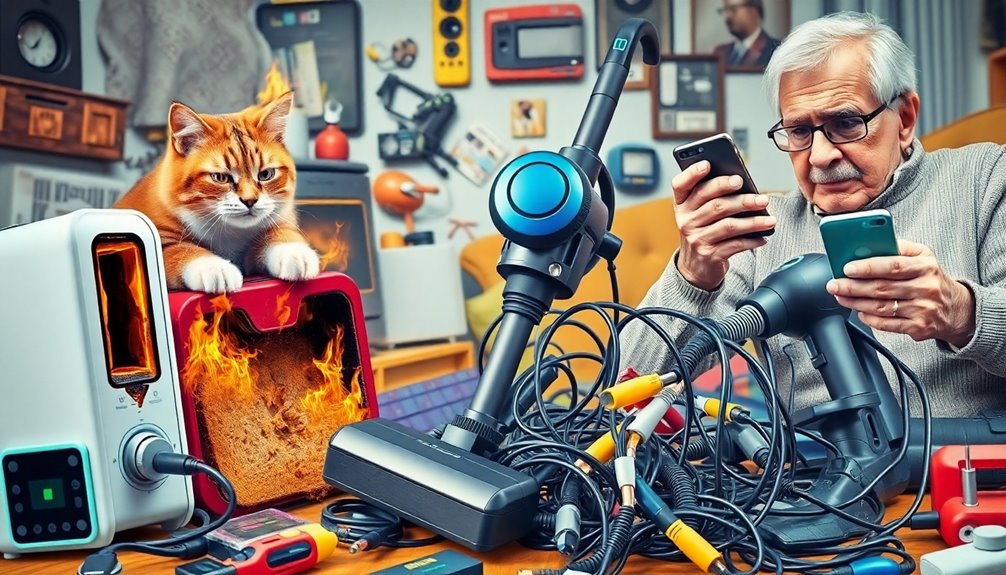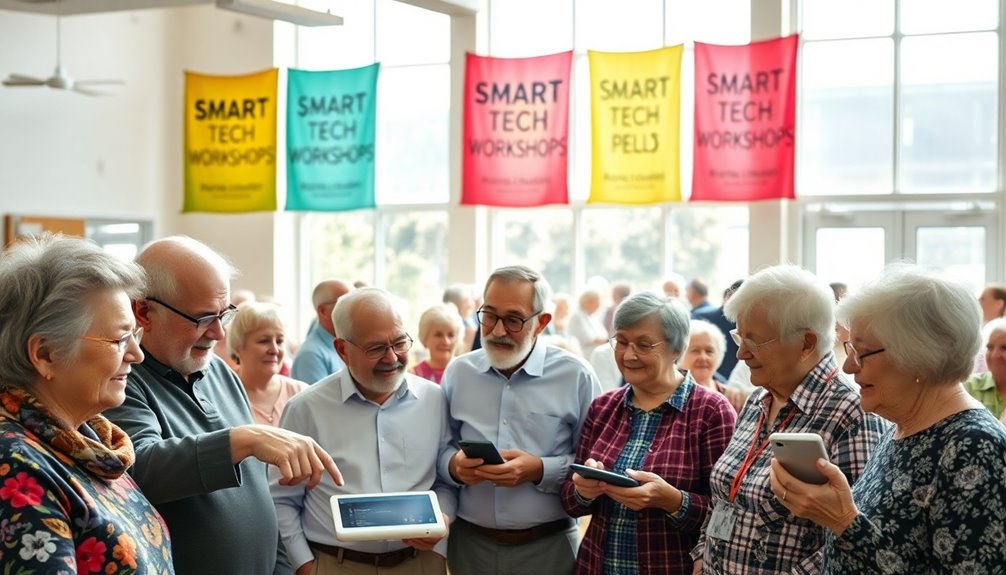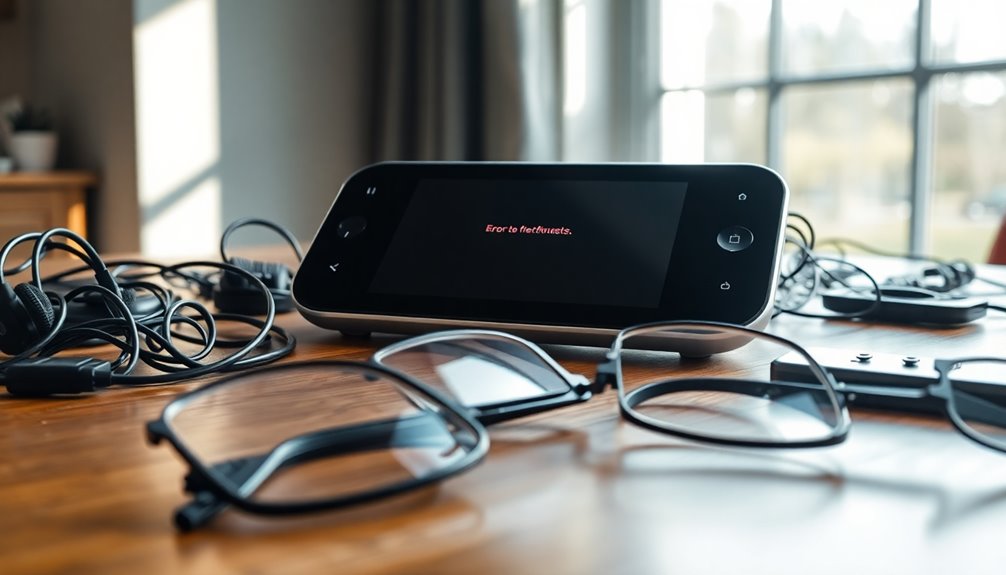I've noticed that many people find smart technology more of a hassle than a help. Devices with overwhelming features often confuse users, making even basic functions tricky. I often hear complaints about constant notifications that distract from what really matters. Plus, there's that nagging fear about privacy when these gadgets collect personal data. I long for simpler tech that didn't need manuals or subscriptions. That's why community discussions and classes can really help us better understand these complexities. If you're curious about what others think and share, there's plenty more insight waiting for you.
Key Takeaways
- Many users find smart technology overly complex, complicating simple tasks and leading to frustration with unnecessary features.
- Devices that require constant monitoring or subscriptions for basic functions are often viewed as excessive and burdensome.
- Users frequently struggle with privacy concerns due to invasive data collection practices and lack of clear instructions on device usage.
- The nostalgia for simpler technology highlights a desire for user-friendly design that doesn't necessitate lengthy manuals or constant updates.
- Community engagement and learning opportunities can reduce intimidation and enhance confidence in using technology effectively.
User Frustrations With Smart Devices
Many users find themselves frustrated with smart devices due to their overwhelming complexity and constant barrage of notifications.
I've felt that frustration myself, especially when I can't even find the basic on/off button! It seems like every new device comes with an avalanche of features I never asked for, making it hard to focus on what I actually need. Some users have reported dissatisfaction with their smart home security systems, particularly regarding the monthly monitoring fees that can add to the overall cost.
The notifications can be downright annoying, pulling my attention away from more important tasks. I often wish for a simpler design, something that doesn't require a manual just to figure out how to turn it on. Furthermore, many users could benefit from improving their indoor air quality, as good air quality significantly impacts overall health and well-being. Proper maintenance of devices can also enhance their efficiency, similar to how regular maintenance can improve the performance of heat pumps. Regular servicing ensures that these devices operate at peak efficiency, just like energy-efficient heat pumps that can significantly reduce energy costs.
And let's not even start on the lack of clear instructions; I miss the good old paper manuals that were straightforward and reliable. Additionally, many smart devices could benefit from proper airflow to enhance their performance, similar to how air purifiers operate effectively.
The Complexity of Modern Appliances

Steering through the complexity of modern appliances can feel like an intimidating task. I often find myself longing for the simplicity of older devices with straightforward on/off buttons.
These high-tech gadgets bombard me with notifications and features I don't understand, making daily tasks more stressful. I've struggled to figure out basic functions, like how to reset my smart oven or adjust the settings on my washing machine. Some of these devices, like air purifiers, can provide significant benefits through effective reduction of allergens, but their smart features can add to the confusion. Regular filter cleaning and replacement are crucial for optimal performance, yet many users are unaware of this essential maintenance step. Users of smart home devices often report feeling overwhelmed by the constant need to integrate new features into their daily routines, which can detract from the original purpose of convenience. Additionally, many models now include smart features that complicate operation for those unfamiliar with technology.
The lack of clear, printed instructions doesn't help either; I miss having a reliable paper manual I can refer to. Sometimes, I just want a machine that does its job without requiring a degree in technology to operate it. Additionally, the integration of smart home devices can complicate the user experience even further, adding layers of complexity that can be overwhelming for many.
Simplicity should be a priority, not an afterthought.
Privacy Concerns and Smart Technology

It's frustrating to realize just how much of my personal data is being collected by smart technology.
Every time I use my smart devices, I can't shake the feeling that they're monitoring my habits and preferences more than I'd like. I worry about who's access to that information and how it's being used. Ads seem to follow me everywhere, making me question the value of my privacy. Cookies do not store personally identifiable data, but the sheer volume of data collected still raises concerns. Additionally, many smart devices, like air purifiers with smart WiFi capabilities, contribute to this data collection, often without clear user consent. User consent for third-party cookie storage is crucial, yet often overlooked. Moreover, the increasing reliance on cybersecurity measures raises questions about how effectively our data is being protected.
I miss the days when appliances didn't require subscriptions or constant updates. It feels invasive when a simple task becomes an opportunity for data collection.
I just want devices that work without compromising my privacy. Honestly, I wish for a return to more straightforward technology that respects user confidentiality. Additionally, the rise of cybersecurity vulnerabilities during major outages highlights the importance of safeguarding our data against unauthorized access.
Digital Literacy Challenges

With the increasing complexity of smart devices and the constant data collection that makes me uneasy, I find myself grappling with digital literacy challenges.
I often feel overwhelmed by the sheer number of features and functions, which can be intimidating. When I first try to use a new device, the lack of clear instructions usually leads to confusion and frustration.
I miss the straightforwardness of older technology, where I could easily find the on/off button without having to sift through endless menus. Plus, learning through trial and error can be stressful.
I recognize that mastering digital tools is essential for maneuvering today's world, but I wish there was a simpler way to adapt and feel more confident in using these gadgets.
Nostalgia for Simpler Tech

The simplicity of older technology often feels like a comforting embrace in a world overwhelmed by complexity. I often find myself reminiscing about the straightforward devices that didn't require a manual to operate.
- Traditional on/off buttons that were easy to find
- Simple instructions printed in paper manuals
- Undemanding appliances without constant notifications
- Devices that didn't require subscriptions for basic use
These relics of the past remind us that not everything needs to be "smart." In a similar way, following a low carb diet can simplify meal planning and promote healthier eating habits. Maintaining a balanced diet can also help us achieve that sense of simplicity in our daily nutrition choices. Just as children thrive with hands-on learning through engaging toys, adults too can benefit from straightforward solutions that foster creativity without overwhelming complexity. Furthermore, the emphasis on quality assurance in software development highlights the importance of simplicity and reliability in technology.
I crave that uncomplicated experience where you just pressed a button and things worked. As technology evolves, I wonder if we can bring back that simplicity, ensuring a balance between innovation and ease of use. Essential oils, like eucalyptus oil, illustrate how natural remedies can provide straightforward solutions without the complications of modern technology.
Don't you miss that too?
Community Engagement and Learning

Engaging with a community can greatly enhance our learning experiences, especially when it comes to steering technology. I've found that participating in group classes or discussions allows me to share frustrations and learn from others.
For instance, Senior Planet offers online sessions that cover everything from health to tech, making it easier to grasp complex topics. I've attended virtual tours and fitness classes that not only keep me active but also connect me with like-minded individuals. Engaging in community events can also strengthen family bonds and promote local engagement, which enriches our learning experiences. Additionally, these forums provide invaluable insights on sleep training methods that can help new parents manage their time and responsibilities better. Moreover, practicing relaxation techniques before sleep can lead to better learning and technology engagement.
These interactions help demystify technology and make it less intimidating. Plus, having access to newsletters keeps me informed and engaged.
When we learn together, we build confidence and skills that make maneuvering today's tech landscape less overwhelming. Additionally, practices like meditation and mindfulness can significantly reduce stress and enhance our ability to engage with technology effectively.
Emerging Trends in Technology

Innovation drives our fascination with emerging technologies, constantly reshaping how we interact with the world. I find it fascinating how much our lives are influenced by these advancements.
Here are some trends that really catch my attention:
- Smartphones are integrating more features, boasting over 3 billion users globally.
- Streaming services are changing how we consume media, with smart TVs expected in 80% of homes by 2025.
- The rollout of 5G promises to enhance connectivity and speed.
- AI is becoming a double-edged sword, raising concerns about misinformation in our digital spaces.
As we navigate these trends, staying informed and learning about their implications is essential.
It's vital we adapt to these changes while maintaining our comfort and privacy.
Frequently Asked Questions
What Are Common Misconceptions About Smart Technology Among Older Adults?
I often hear older adults believe smart technology is too complicated or unnecessary. They think it requires constant updates and subscriptions, leading to frustration. Many just want straightforward functionality without invasive features or overwhelming notifications.
How Can I Simplify My Smart Device Settings for Easier Use?
To simplify my smart device settings, I've turned off unnecessary notifications, created straightforward shortcuts, and opted for voice commands. I also keep a printed guide handy for quick reference, making everything feel less overwhelming.
Are There Alternatives to Subscription-Based Smart Devices?
I've found that alternatives to subscription-based smart devices do exist! Look for traditional appliances or smart devices with one-time purchases. They often offer basic functions without the hassle of ongoing fees or complex settings.
How Can I Protect My Privacy When Using Smart Technology?
Privacy protection's paramount! I've started securing my smart technology by disabling unnecessary notifications, using strong passwords, and regularly reviewing settings. Staying savvy about apps helps me maintain control over my personal information. Stay safe!
What Resources Are Available for Learning About Smart Devices?
I've found great resources for learning about smart devices, like online courses, community workshops, and user manuals. They help me understand features better, making technology less overwhelming and more enjoyable to use in daily life.
Conclusion
In this whirlwind of "smart" technology, it's easy to feel overwhelmed and outsmarted. We're caught in a cycle of confusion, craving clarity amidst the clutter. As we navigate these nuances, let's not forget the joy of simplicity. By sharing our stories and struggles, we can foster a community of understanding and support. Together, we can transform our tech troubles into triumphs, ensuring that innovation serves us, not the other way around. Let's embrace the balance!









